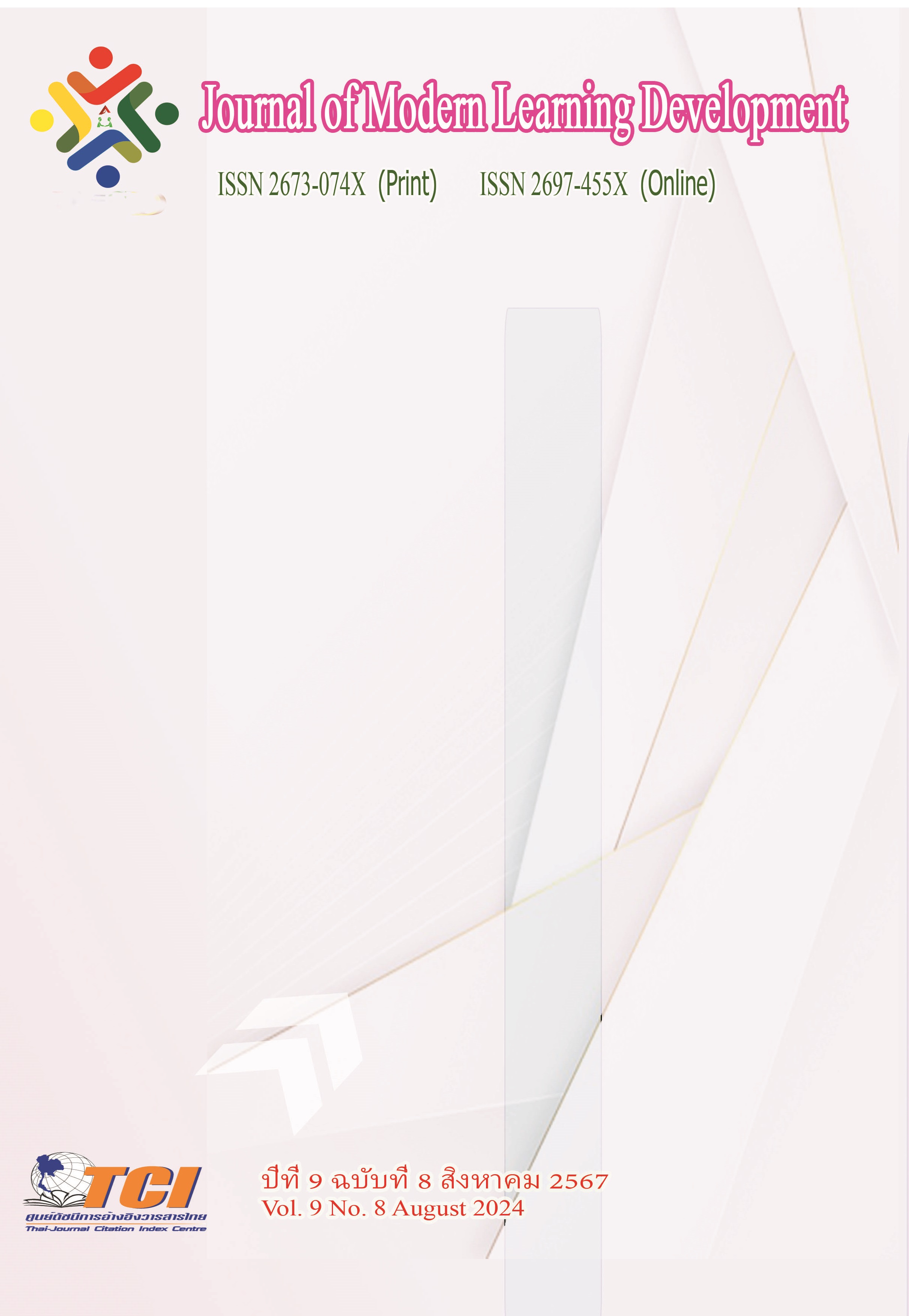The Meaning of Store Names in Chinese: The Representation of Chinese Auspiciousness Beliefs of Thai-Chinese Hokkien in Phuket Old Town
Main Article Content
Abstract
This research mainly discusses about the meaning of Chinese shop names: a reflection of the beliefs about auspiciousness among Thai Hokkien Chinese people in Phuket Old Town. The aim of this study was to examine the language patterns inherent in Chinese shop names within the Thai community of Hokkien Chinese lineage. Additionally, the investigation sought to analyze the connotations embedded in Chinese shop names, specifically those indicative of beliefs and values associated with auspiciousness among individuals of Thai descent with Hokkien Chinese roots. The study focused on a sample comprising ten shops, where the names of the establishments were presented in the Chinese language. This research used qualitative research and the data analysis used Content Analysis, Thematic Analysis, and Historical Analysis. Based on the findings, the researchers conclude that the store sign survey results and interviews with store owners’ states that store owners choose words with auspicious meanings. Language is also determined by attitudinal, language, commercial, and other factors. In conclusion, this study indicates that the significance of Chinese shop names mirrors the auspicious beliefs held by individuals of Hokkien Chinese descent in Phuket Old Town, Thailand.
Article Details
References
Rapeephat, A. (2008). วัฒนธรรมคือความหมาย ทฤษฎีและวิธีการของคลิฟฟอร์ด เกียร์ซ, กรุงเทพ มหานคร: ศูนย์มานุษยวิทยาสิรินธร, 71-81.
Borivethanan, P. (2023) Phuket Old Town. Online. Retrieved November 15, 2023. From: https://wikicommunity.sac.or.th/community/1096#
Bowonphichayanurak, S. (2018). Chinese Shop Signs: A Case Study in the Saphan Khwai and Yaowarat Areas.
Chatwankhiri, L. (2021). Comparison of restaurant naming in Mueang District, Chiang Mai Province and Fuzhou City, China.
Deluzain, H. E. (1996). Names and personal identity. Behind the name. Online. Available: http://www.behindthename.com/articles/3.php (November 16, 2023)
Fuangfusakul, A. (2003). Identity: Review of theory and conceptual framewor k.Ba ngkok: National Research.
Hall, S. (1997). Representations Cultural: Representations and Signifying Practic es ,17-19.
Jitmung, P. (2011). Naming streets in Bangkok. Master of Arts Thesis in Thai Language, Chulalongkorn University.
Leesakul, T. (2019). Names of Chinese shop signs in the upper and lower markets, Mueang District, Nakhon Pathom Province.
Mbarachi, C.S. & Igwenyi, E. (2018). ‘Language, identity and the cultural context of names in selected Nigerian novels’, International Journal of Language and Literature. 6 (1), 29–37. https://doi.org/10.15640/ijll.v6n1a5
Natthaphong Rak Ngam. (2016). The concept of local identity under the context of change in the era of globalization. Nakhon Lampang Buddhist College Journal. 5 (2).
Sodsongkrit, M. (2023). Survey and analysis of Chinese shop names of Thai-Chinese people in Mueang District, Ubon Ratchathani Province
Thepsingh, P. (2010). Background of Phuket's relationship with Western nations and China. In the community in the PSU wisdom warehouse. Online. Retrieved on 26 September 2022, from https://kb.psu.ac.th/psukb/bitstream/2553/5354/20/ ch2.pdf
Wipolchai, N. (2021). ภาษา สื่อ ความ หมาย: ภาษาสะท้อนคติความเชื่อจากการตั้งชื่อยาและชื่อโรคในตำราแพทย์ศาสตร์ สงเคราะห์. Suratthani Rajabhat Journal. 8 (1), 29-54.
Yothinsirikul, S. (2020). Language on shop signs for Thai-Chinese people in the Yaowarat community: A case study of Chinese and Thai shop names.
Yothinsirikul, S. (2018). A study of Chinese-language gold shops among Thai-Chinese people in Bangkok.


